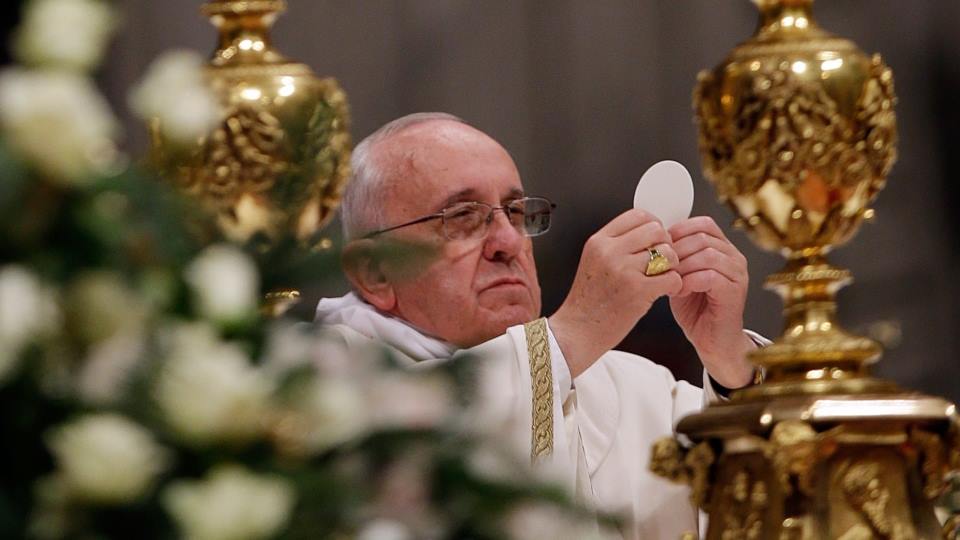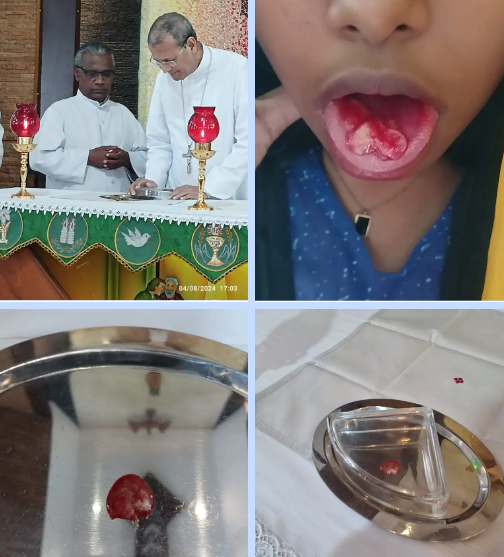
The Holy Eucharist: The True Meal That Satisfies Beyond Earthly Riches
Beyond the World’s Richest Foods: The Food That Truly Fulfils?
Do you know which is the most expensive food in the world? It’s not gold-encrusted desserts or rare truffles. It’s Beluga caviar, the delicacy of sturgeon fish eggs, which can cost over $35,000 per kilogram. A single serving at a high-end restaurant can range from $200 to $500 per person, depending on the portion size and quality. This luxurious food, often enjoyed by the wealthy, is prized for its rarity and exquisite taste. Yet, while such foods might satisfy our physical cravings, they cannot offer the true fulfillment, peace, or eternal life that every human heart yearns for.
So, what is that food that can give us eternal life, true peace, and lasting happiness?
It is the Holy Eucharist. The Eucharist offers what no earthly food can—the Bread of Life, which leads to eternal joy, peace, and divine strength. As Jesus Himself said, “Do not labour for the food that perishes, but for the food that endures to eternal life, which the Son of Man will give to you” (John 6:27). The Eucharist is the true nourishment that satisfies our deepest hunger, offering not only sustenance for the body but healing and grace for the soul.
The Word Made Flesh: A Divine Mystery
In John 1:14, we read, "And the Word became flesh and dwelt among us, and we have seen his glory, glory as of the only Son from the Father, full of grace and truth." This verse highlights the Incarnation, where Jesus, the eternal Word, became flesh for the salvation of humanity. The Eucharist is a continuation of this mystery, where Christ gives us His very Body and Blood under the appearance of bread and wine.
The Holy Eucharist: The Word Made Flesh and Our Daily Bread
In the journey of faith, the Holy Eucharist stands as the pinnacle of Christian worship and devotion. It is not just a symbol but a profound reality where the Word of God, made flesh, becomes our spiritual nourishment. The Eucharist is more than a ritual; it is a powerful encounter with Jesus Christ Himself, the Bread of Life who promises eternal life to those who partake in Him.
The Holy Eucharist is the fulfillment of Jesus' promise to remain with us always, even to the end of the age. As Catholics, we believe in the real presence of Christ in the Eucharist—His Body, Blood, Soul, and Divinity. This belief is rooted in the words of Jesus at the Last Supper: “This is my body, which is given for you. Do this in remembrance of me” (Luke 22:19). The bread and wine, through the mystery of transubstantiation, become the actual Body and Blood of Christ. When we receive the Eucharist, we are not receiving a symbol, but Christ Himself, who has come to dwell within us.
This mystery is echoed in John 6:53-56, where Jesus says, “Truly, truly, I say to you, unless you eat the flesh of the Son of Man and drink his blood, you have no life in you. Whoever feeds on my flesh and drinks my blood has eternal life, and I will raise him up on the last day.” The Eucharist is the living Word of God made flesh, nourishing our souls and sustaining us in our daily lives.
Pope St. John Paul II, a great champion of the Eucharist, emphasized its central role in the life of the Church and every believer. He once said, "The Church draws her life from the Eucharist." In his encyclical Ecclesia de Eucharistia, he wrote: "In the humble signs of bread and wine, changed into His body and blood, Christ walks beside us as our strength and our food for the journey, and He enables us to become, for everyone, witnesses of hope."
The Promise of Eternal Life
Jesus promises eternal life to all who partake in His Body and Blood. He says, “Whoever feeds on my flesh and drinks my blood abides in me, and I in him” (John 6:56). This promise is not just for the future; it begins here and now as we receive the Eucharist and allow Christ to dwell within us. The saints who have gone before us bore witness to this truth, finding their strength, joy, and hope in the Eucharist.
The Eucharist is our foretaste of heaven, a glimpse of the eternal banquet that awaits us. It is a source of divine power, enabling us to live out our faith with courage and conviction. As St. John Vianney beautifully said, “There is nothing so great as the Eucharist. If God had something more precious, He would have given it to us.”
The Power of the Eucharist in the Lives of Saints
The Holy Eucharist has been a profound source of spiritual strength and divine grace for countless saints throughout the history of the Church. For them, the Eucharist was not just a sacrament but the very heartbeat of their spiritual lives, sustaining them in their mission, prayers, and trials. Their testimonies serve as a powerful reminder of the transformative power of the Eucharist, urging us to approach this sacrament with deeper faith and reverence.
St. Teresa of Calcutta, known for her tireless work among the poorest of the poor, once said, “When you look at the Crucifix, you understand how much Jesus loved you then; when you look at the Sacred Host, you understand how much Jesus loves you now.” For her, the Eucharist was the daily bread that sustained her in her mission, giving her the strength to love and serve others as Christ did.
Pope St. John Paul II often spoke of the Eucharist as the centre of his life and ministry. He said, “In the Eucharist is the secret of my day. It gives strength and meaning to all my activities of service to the Church and to the whole world.” This sentiment reflects the profound truth that the Eucharist is not just a part of our faith but the heart of our relationship with Christ.
Similarly, St. Thérèse of Lisieux, known as the "Little Flower," expressed her deep love for the Eucharist: "Do you realize that Jesus is there in the tabernacle expressly for you—for you alone? He burns with the desire to come into your heart." Her spirituality was rooted in a profound relationship with Jesus in the Eucharist, which fuelled her love and dedication to others.
St. Padre Pio, who bore the stigmata, said, "It would be easier for the world to survive without the sun than to do without the Holy Mass." For him, the Eucharist was the source of all his spiritual power, especially in his ministry of healing and reconciliation.
May we, too, draw strength from the Eucharist, allowing it to transform us, sustain us, and guide us in our journey of faith. As we partake in this sacred meal, we join the saints in their profound devotion and love for the real presence of Christ in the Eucharist, who remains with us, truly and wholly, until the end of time.
Eucharistic Miracles: A Testament to Christ’s Real Presence
Throughout history, the Church has witnessed numerous Eucharistic miracles that testify to the real presence of Christ in the Eucharist. One of the most recent and remarkable occurred at St. Sebastian’s Church in Madavana, Kerala, India, in 2024. During the Holy Mass, the Holy Host miraculously turned into real flesh and blood in the mouth of a fourteen-year-old girl on four consecutive Sundays. The Archdiocese of Verapoly is now overseeing the investigation of these events, following the Church’s established protocol for examining alleged Eucharistic miracles. The preserved Hosts will undergo scientific tests, which will be compared against the standards for recognizing authentic Eucharistic miracles.

Two other well-documented Eucharistic miracles include the Miracle of Lanciano in Italy and the Miracle of Buenos Aires in Argentina. In both cases, the consecrated Host turned into flesh and blood, which, upon scientific examination, was found to be human heart tissue. These miracles are tangible signs of Christ's real presence and the transformative power of the Eucharist. Discover 10 of the most famous Eucharistic miracles recorded throughout history
Conclusion
The Holy Eucharist is the greatest gift that Christ has left us, a gift that transcends all earthly riches and pleasures. It is the true Bread of Life that nourishes our souls, strengthens us for the journey of faith, and unites us with Christ. In the Eucharist, we encounter the Word made flesh, the living presence of Jesus who offers us eternal life. As we receive this sacred gift, let us do so with hearts full of gratitude, love, and devotion, recognizing that in the Eucharist, we find all that we need—our strength, our hope, and our salvation.

